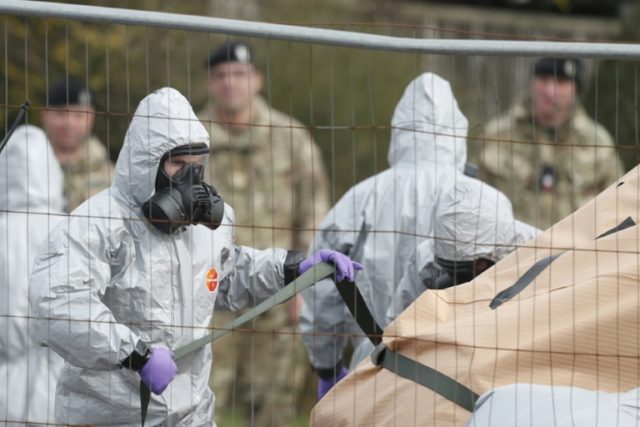Moscow (AFP) – Moscow denied Friday a British news report that the nerve agent used against a Russian ex-spy in England came from a military facility on the Volga River.
Britain blames Russia for the March 4 poisoning of former double agent Sergei Skripal and his daughter Yulia, a charge the Kremlin furiously denies.
Britain claims the pair were attacked using a Soviet-made military-grade nerve agent.
The affair has sparked a crisis in ties between Russia and the West and a wave of tit-for-tat expulsions of diplomats.
On Thursday, The Times newspaper cited British security sources saying they believed the Novichok nerve agent was manufactured at a facility in the town of Shikhany southeast of Moscow.
Several Russian officials said Friday that no chemical weapons were ever stored at Shikhany, though they stopped short of specifically addressing the claim that Novichok was made there.
“This laboratory was never part of the scope of our work,” Mikhail Babich, the Kremlin’s envoy in the Volga region and former chairman of the state commission for chemical disarmament, told Interfax news agency.
“All the bases where chemical weapons were stored are well-known. Shikhany is not one of them,” said Babich.
He added there used to be another such “facility” in the surrounding Saratov region but it was not located in Shikhany.
The Times report came after the British defence laboratory analysing the nerve agent said that it could not say whether the substance came from Russia.
The closed town of Shikhany is the location of a branch of the State Scientific Research Institute of Organic Chemistry and Technology (GNIIOKhT).
Several scientists have said that Novichok, a group of nerve agents, was invented by scientist Pyotr Kirpichev in Shikhany.
The scientists claiming this include Vil Mirzayanov, who first revealed the existence of Novichok and now lives in the United States.
— Oath of silence —
One of the chemists who worked on the nerve agent, Vladimir Uglev, told independent newspaper Novaya Gazeta that components to produce the weapon could be bought in several countries so it was difficult to pinpoint the country of origin.
Uglev said he was not able to say the word “Novichok” because he had signed an oath not to disclose classified information.
Russian authorities have insisted the country never had any programmes to develop the chemical weapon.
Mirzayanov also said it was difficult to establish where the nerve agent came from but added he understood the reasons for Britain’s claim.
“No country has as much experience in manufacturing Novichok as the USSR and then Russia,” he told Novaya Gazeta.
Last month, Russian scientist Leonid Rink told state media he worked for 27 years at a state laboratory in Shikhany, where the development of Novichok formed the basis of his doctoral dissertation.
According to the website of GNIIOKhT, its branch in Shikhany is now involved in work related to “ensuring the security” of the country and destruction of chemical weapons.
In September 2017, Russian President Vladimir Putin said Moscow had destroyed its last chemical weapons.
– ‘You’ll be sorry’ –
On Thursday, Skripal’s daughter Yulia said she was recovering, in her first public statement since the poisoning.
“I woke up over a week ago now and am glad to say my strength is growing daily,” she was quoted as saying in comments released by the police.
The hospital where the pair are being treated said last week that Sergei Skripal remained in a critical condition.
At a UN Security Council meeting on Thursday, Russia deflected accusations of poisoning, with Moscow’s envoy issuing a series of denials and insults.
“Couldn’t you come up with a better fake story?” Vassily Nebenzia told the council. “We have told our British colleagues that ‘you’re playing with fire and you’ll be sorry.’”
Russia called for UN Security Council talks a day after it failed to win diplomatic support for a joint probe of the poisoning at a meeting of the global chemical watchdog, the Organisation for the Prohibition of Chemical Weapons.
burs-as/am/rlp

COMMENTS
Please let us know if you're having issues with commenting.